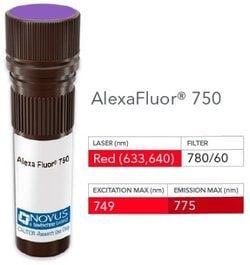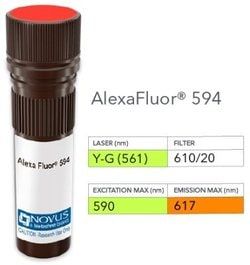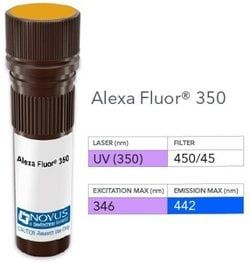Endorepellin/Perlecan/Heparan Sulfate Proteoglycan Antibody (A7L6), Alexa Fluor™ 350, Novus Biologicals™
Manufacturer: Novus Biologicals
Select a Size
| Pack Size | SKU | Availability | Price |
|---|---|---|---|
| Each of 1 | NB007168-Each-of-1 | In Stock | ₹ 57,494.00 |
NB007168 - Each of 1
In Stock
Quantity
1
Base Price: ₹ 57,494.00
GST (18%): ₹ 10,348.92
Total Price: ₹ 67,842.92
Antigen
Endorepellin/Perlecan/Heparan Sulfate Proteoglycan
Classification
Monoclonal
Conjugate
Alexa Fluor 350
Formulation
50mM Sodium Borate with 0.05% Sodium Azide
Gene Symbols
HSPG2
Immunogen
Murine EHS laminin preparation
Quantity
0.1 mL
Primary or Secondary
Primary
Target Species
Human, Mouse, Porcine, Fish, Monkey
Isotype
IgG2a κ
Applications
Flow Cytometry, Immunohistochemistry, Immunohistochemistry (Paraffin), Immunofluorescence
Clone
A7L6
Dilution
Flow Cytometry, Immunohistochemistry, Immunohistochemistry-Paraffin, Immunofluorescence
Gene Alias
basement membrane-specific heparan sulfate proteoglycan core protein, endorepellin (domain V region), heparan sulfate proteoglycan 2, HSPG, perlecan, perlecan proteoglycan, PLCSchwartz-Jampel syndrome 1 (chondrodystrophic myotonia), PRCAN, SJA, SJS, SJS1
Host Species
Rat
Purification Method
Protein A or G purified
Regulatory Status
RUO
Test Specificity
This monoclonal antibody specifically precipitates heterogeneous material of high MW, identified as perlecan, a major heparan-sulfate proteoglycan (HSPG) within all basement membranes and cell surfaces. It does not cross-react with laminin, fibronectin, or dermatran sulfate proteoglycan. Because of perlecans strategic location and ability to store and protect growth factors, it has been strongly implicated in the control of tumor cell growth and metastatic behavior. Perlecan possesses angiogenic and growth-promoting attributes primarily by acting as a co-receptor for basic fibroblast growth factor (FGF-2). Suppression of perlecan causes substantial inhibition of neoplastic growth and neovascularization. Thus, perlecan is a potent inducer of neoplasm growth and angiogenesis in vivo and therapeutic interventions targeting this key modulator of tumor progression may improve neoplastic treatment.
Content And Storage
Store at 4°C in the dark.
Related Products
Description
- Endorepellin/Perlecan/Heparan Sulfate Proteoglycan Monoclonal specifically detects Endorepellin/Perlecan/Heparan Sulfate Proteoglycan in Human, Mouse, Porcine, Bovine, Fish, Monkey samples
- It is validated for Flow Cytometry, Immunohistochemistry, Immunocytochemistry/Immunofluorescence, Immunohistochemistry-Paraffin, Immunofluorescence.



